The Southern Baptist Convention’s Deal With the Devil
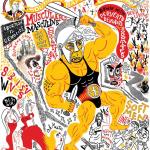
In June, at the Southern Baptist Convention’s annual meeting in Anaheim, Calif., Albert Mohler Jr., the president of the denomination’s flagship seminary and one of its leading theologians, was asked whether he believed that women who have abortions should be prosecuted for murder. Mohler acknowledged that there could be gray areas, such as miscarriages, but came down on the side of criminalizing women. “There are many cases in which, demonstrably, there is not just an abortionist who should face criminal consequences, but a woman seeking an abortion,” he said to applause. “That is something we believe the law should pursue.” Law enforcement could pursue such cases, he added, if the final version of the Supreme Court’s opinion in Dobbs v. Jackson Women’s Health Organization, eliminating the constitutional right to an abortion, resembled the draft that had leaked in May.
Ten days later, after the Supreme Court handed down its opinion, Mohler celebrated the end of Roe v. Wade on his daily podcast, The Briefing. The majority opinion, he said, amounted to “a reversal of a revolution,” one that could lead to the demise of other Supreme Court decisions reviled by the Christian right, including Obergefell v. Hodges, the 2015 decision enshrining marriage equality as the law of the land. “I rejoice in this day,” Mohler said, praising in particular a shift away from the influence of Chief Justice John Roberts, who “was unwilling to stand with the majority of conservative justices” to invalidate Roe. The court’s center of power, Mohler continued, now rested with a “resurgent conservative majority” led by Justice Samuel Alito, who, with his majority opinion, had “stuck a dagger in the heart of liberal jurisprudence.”
Mohler’s jubilation over the death blow to liberal jurisprudence echoes the recent history of his denomination, which underwent its own right-wing radicalization in the 1980s and ’90s. Known to its proponents as the “conservative resurgence” (and to its critics as the “fundamentalist takeover”), the radicalization of the Southern Baptist Convention (SBC) fueled the rise of the modern religious right and its formal marriage to the Republican Party. That transformation has reverberated throughout our politics, as Southern Baptists have forged unprecedented alliances with Catholics and other conservative Christians in a quest to drive progressive advances back to the margins, much as they had driven liberals out of their own denomination. In the years since the takeover, the homophobic, transphobic, and patriarchal views cemented in official Southern Baptist statements have become the gospel of the denomination and its 14 million members, a bellwether for tens of millions of other evangelicals, and the lodestar of the Republican Party, whose leaders have sought the moral imprimatur of popular Southern Baptist leaders. The reach of this regressive theology into our national politics is now at a historic apex, with Dobbs energizing the right’s pursuit of ever more punitive crackdowns on abortion and a revitalized offensive against LGBTQ rights.
From the presidency of Ronald Reagan through that of Donald Trump, Southern Baptist leaders played influential roles in blessing Republican presidential candidacies, vetting Supreme Court justices, and shaping policy. Just as the SBC’s conservatives seized control of their own denomination, purging moderate pastors and churches, the religious right took over the GOP, playing a key role in turning it into today’s Trumpian party of white Christian nationalism.
The history of the conservative resurgence begins in Texas, where Paul Pressler, a Southern Baptist layman and state appellate court judge, and his friend Paige Patterson, the president of Criswell College, part of the influential First Baptist Church in Dallas, set out to cleanse the denomination of attempts by liberals to dilute the dogma of “biblical inerrancy.” As Pressler told the journalist Bill Moyers in 1987, he became aware of the alleged drift of Southern Baptist theology via a medium strikingly familiar to any observer of the contemporary right’s backlash against pluralism: textbooks. Pressler told Moyers that a student in his Bible study group who attended Baylor University, a Southern Baptist school in Waco, Tex., had told him that the freshman religion textbook said there were errors in the Book of Daniel.
After investigating this supposed transgression, Pressler said, he resolved to ensure that no one at the helm of any Southern Baptist institution would ever again allow any suggestion that the Bible was not 100 percent true. He traveled the country, urging Southern Baptists to attend the denomination’s annual meeting and elect leaders who would “make the proper appointments to change the trustees so that the trustees could properly function in correcting the problems at their institutions.”
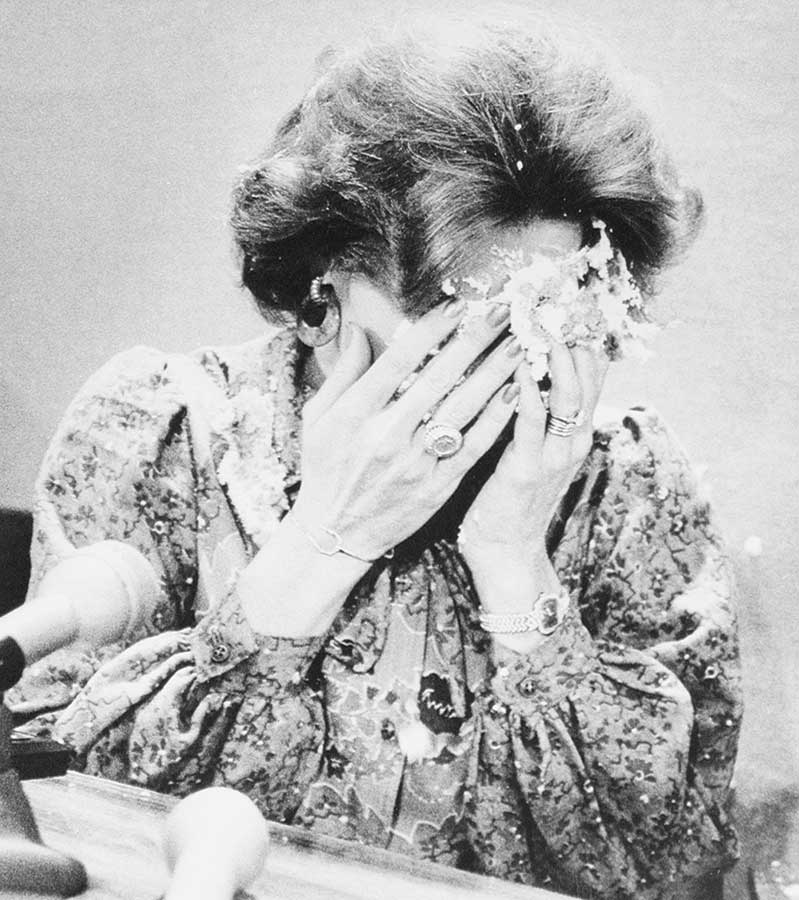
Facing the facts: Anti-gay crusader Anita Bryant in Des Moines in 1977, after a gay rights activist threw a pie in her face. (Bettmann)
Pressler’s plan, executed with Patterson, would alter the course of American politics. Pledges to respect “biblical inerrancy” became the litmus test for leadership positions within the denomination. The SBC also enforced traditional gender roles and barred women from preaching. In 1979, Pressler advocated for the election of the anti-gay crusader Anita Bryant to a top leadership position within the denomination. This was two years after Bryant had founded the organization Save Our Children to force the repeal of a gay rights ordinance in Miami. (Her slogan “Homosexuals cannot reproduce, so they must recruit” has been revived in the form of Florida’s current “Don’t Say Gay” law, also rooted in homophobic tropes that queer people “groom” children.) Bryant lost the SBC race, which Pressler attributed to the unwillingness of Southern Baptists to elect a woman to the post. But Bryant’s anti-gay politics would become the cornerstone of the religious right’s strategy for seizing power within the GOP.
By 1979, the year the religious right was coalescing around the candidacy of Ronald Reagan (not a regular churchgoer) over the reelection bid of Jimmy Carter (a liberal Southern Baptist Sunday school teacher), the fundamentalist takeover of the SBC was complete. For Southern Baptists like Moyers, it was a travesty and “alien to my experience growing up” in his own church in Marshall, Tex. In his 1987 broadcast on the conservative resurgence, Moyers lamented the expulsions of more liberal-minded churches and officials from the denomination and the jettisoning of the Southern Baptist tradition of respecting the line between church and politics. The fundamentalists’ “determination to make one view of the Bible—their view—the test of religious and political truth,” Moyers said, was “radical, and for America it’s political dynamite, because how Baptists read the Bible affects how they cast their ballots.”
Pressler was lionized in Republican circles for his role in leading the conservative resurgence. He joined the Council for National Policy, the secretive, agenda-setting brain trust of the right founded in 1981, serving as its president from 1988 to 1990. When President Reagan nominated Robert Bork for the Supreme Court, Pressler and Patterson supported him and met with White House staff to strategize. And in 1989, President George H.W. Bush’s religious adviser, Doug Wead, recommended Pressler for a post as director of the Office of Government Ethics, writing in a memo that Pressler possessed “tremendous integrity and moral qualities” and that his nomination “would send a strong signal” to evangelicals that “we want to include their ideas, their values and their leaders in this administration. A routine background investigation found unspecified “ethics problems” with Pressler’s nomination, however, and it was withdrawn. Yet Pressler retained his status as an elder statesman in Republican and evangelical politics. In 2012, he hosted influential conservatives at his Texas ranch, where they decided to endorse Rick Santorum for president. In 2015, Pressler endorsed Ted Cruz, saying he had known the rising Republican star since he was a teenager.
The growing conservative Christian legal movement also sought Pressler’s imprimatur for its efforts to build law schools that would teach its approved version of jurisprudence. In 2007, Louisiana College, a Southern Baptist school in Shreveport, announced it was launching a law school that would be named after Pressler. The school appointed religious right luminaries like James Dobson, the founder of Focus on the Family; Tony Perkins, the president of the Family Research Council; and Ted Cruz to its board. At a 2010 press conference announcing the acquisition of a building for the school, Pressler said, “Law is the way we maintain society, and without the Christian concept, and without the Christian dedication, there is no way that democratic government is going to operate effectively.” Pressler recognized elected Republicans in the audience, including a young state legislator from Texas, Bryan Hughes, who, he promised, would be an “outstanding Christian” lawmaker. (Hughes would go on to become a coauthor of SB-8, the 2021 Texas law that bans abortion at six weeks and offers a $10,000 bounty to private citizens who sue anyone who helps a person get an abortion.) After raising $5 million, acquiring a building, and starting construction, the college ultimately abandoned its plans for the law school in 2014.
Richard Land, a protégé of Pressler’s who was hired in 1988 to lead the SBC’s policy arm in Washington, D.C., now known as the Ethics and Religious Liberty Commission, became one of the leading public figures in the religious right and one of the foremost advocates for a full-on alliance between evangelicals and the Republican Party, according to Aaron Weaver, a scholar of the Southern Baptist Convention. Land became a go-to source for journalists looking for a quote about evangelicals and politics, and Time magazine named him one of the country’s 25 most influential evangelicals in 2005, a year considered a high point of evangelical influence in Washington because of their proximity to the George W. Bush White House. When Land left his post in 2013 amid controversies over alleged plagiarism and racist comments, he was lauded within Southern Baptist circles for his role in bringing the denomination’s opposition to abortion and LGBTQ rights to the fore.
“No one in our lifetime has had a greater impact on the social and ethical attitudes and actions of Southern Baptists than Richard Land,” said Jimmy Draper, a former SBC president, in a keynote address at a 2013 dinner in Land’s honor.
Other Pressler protégés have become powerful figures in the ongoing effort to pull the Texas Republican Party ever rightward. Jared Woodfill began practicing law with Pressler in the mid-2000s, after Pressler retired from the bench. Pressler, Woodfill told me in 2017, introduced him to Steven Hotze, a doctor, a supplier of dietary supplements, and a Christian nationalist political activist; the pair have used their organization, Conservative Republicans of Texas, to attack those Republicans who were insufficiently right-wing and to condemn LGBTQ people as “perverts,” “deviants,” and “sodomites.” Woodfill and Hotze were the architects of a 2014 anti-trans campaign in Houston that provided a template for anti-trans activists across the country.
More recently, Hotze has embraced Trump’s lies and conspiracy theories about a stolen election. In April, he was indicted for a convoluted scheme in which he allegedly hired a former Houston police officer to root out supposed voter fraud in the 2020 election. Prosecutors said the former cop surveilled an air-conditioning repairman he falsely believed was carrying ballots in the back of his van and tried to run him off the road. Hotze has denied the allegations. Woodfill, who is representing Hotze, did not respond to a request for comment.
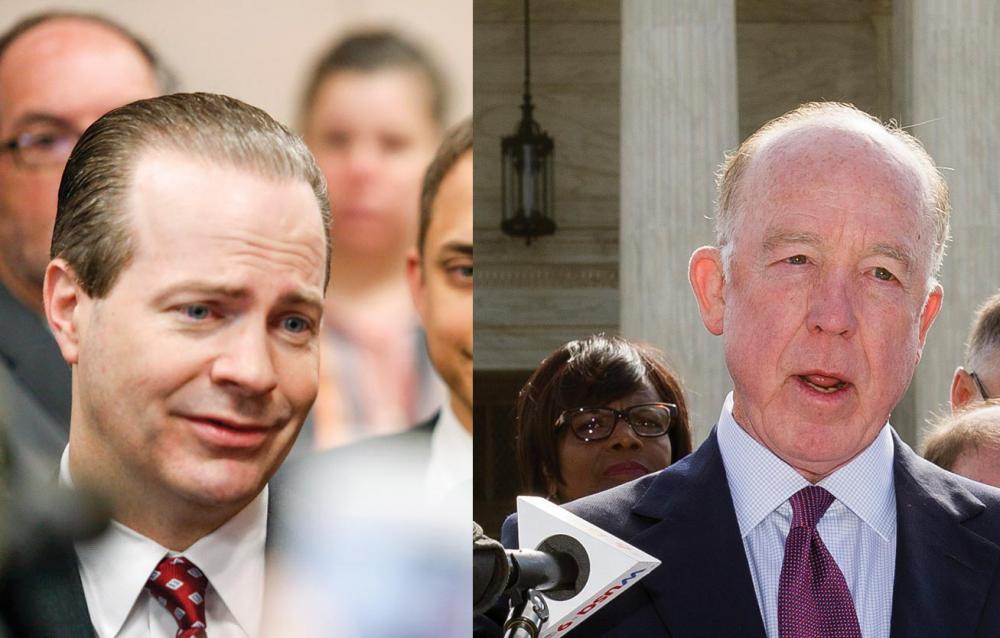
Pressler’s boys: Jared Woodfill (left) and Steven Hotze, architects of the 2014 anti-trans campaign in Houston. (left: Eric Kayne / Getty Images; right: Cliff Owen / AP)
Under the dominance of the conservative resurgence, a deeply patriarchal orthodoxy on matters of gender roles took hold within the SBC. In 1987, the denomination adopted a resolution stating that while some women choose careers outside the home, homemakers “have shown…unwavering commitment to their families and to the Lord who has ordained the home as a workplace.” They deserved recognition because they had “pleased our God by honoring His purposes in their lives each day.”
In 1998, Southern Baptists amended their “Baptist Faith and Message” statement for the first time in 35 years in order to include a provision on wifely submission, written by Patterson’s wife, Dorothy. The new language stated that a wife should “submit herself graciously” to her husband, who “has the God-given responsibility to provide for, to protect and to lead his family.”
Regressive positions on gender roles were accompanied by increasingly extreme positions on abortion. In 1971, prior to the fundamentalist takeover, the SBC had called for “legislation that will allow the possibility of abortion under such conditions as rape, incest, clear evidence of severe fetal deformity, and carefully ascertained evidence of the likelihood of damage to the emotional, mental, and physical health of the mother.” In 1976 it called for a limited government role in “a very serious moral and spiritual problem.” Once the takeover was underway, the resolutions progressed from calling for legislation banning abortion except to save the mother’s life (1980) to calling abortion a “national sin” (1984) to praying “for the day when the act of abortion will be not only illegal, but also unthinkable” (2003). By 2015, the SBC was officially calling abortion a “genocide.” At the 2019 annual meeting, then–SBC president J.D. Greear, widely seen as representing a break from the style of the conservative resurgence’s old guard, called abortion “the greatest moral crisis of our generation.”
Southern Baptists also led the way in injecting homophobic theology into public policy and legislative debates, wielding their influence as the nation’s largest Protestant denomination, with the theological clout to influence tens of millions of other evangelicals. In official denominational statements, they repeatedly condemned homosexuality as a “perversion,” “deviant behavior,” evidence “of a depraved nature,” and “an abomination and shameful before God.”
At a 2007 meeting, as Congress debated an anti-hate-crimes bill named for Matthew Shepard, the gay college student who was tortured to death in Wyoming in 1998, the SBC adopted a resolution urging lawmakers and then-President George W. Bush not to support the legislation because “the Bible is clear in its denunciation of homosexual behavior.” Because of such biblical teachings, they contended, “our Founding Fathers and early laws opposed its practice in American society.” The resolution also stated, invoking a well-worn trope, that a hate crimes law would be used “to actively punish Christians who peacefully voice their moral opposition to homosexual conduct.”
Bush responded by sending video greetings to the SBC gathering. “You’re living out the call to spread the Gospel and proclaim the Kingdom of God,” he said. “Thank you for your strong voice in the public square.” The Matthew Shepard Hate Crimes Prevention Act did not become law until 2009, when Barack Obama was president.
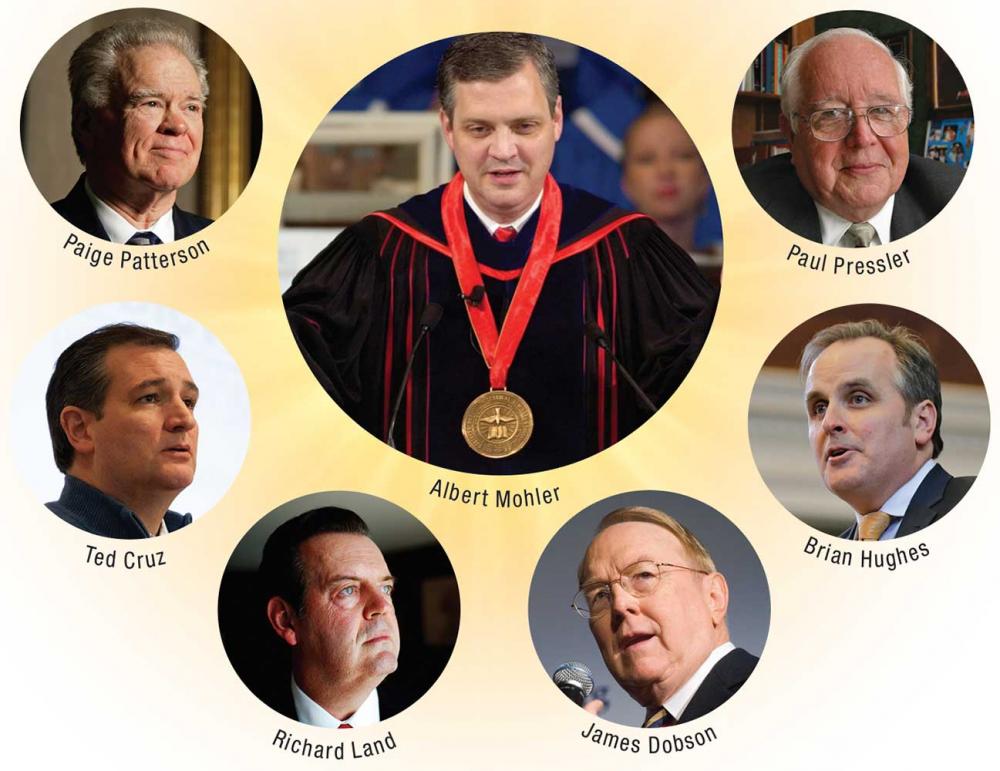
Eyes right: Long before they had the power to vet judges and bless presidential candidates, the Southern Baptists underwent their own “conservative resurgence.” (clockwise from top left: Paul Moseley / Star-Telegram via AP; Ed Reinke; Michael Stravato / AP; Eric Gay / AP; CQ Roll Call via AP; David Howells / Corbis via Getty Images; Matthew Cavanaugh / Getty Images)
On August 12, more than 40 years into the SBC’s march toward imposing its homophobic, patriarchal theology on American politics and law, the denomination revealed that the Department of Justice was investigating allegations of sexual abuse against members of its clergy. The announcement came three months after a blistering report, prepared by the independent consulting firm Guidepost Solutions, documented over two decades of sexual abuse (including rape), cover-ups, and the mistreatment and intimidation of survivors. The SBC had retained Guidepost under pressure, following the publication of an explosive 2019 investigation by the Houston Chronicle and San Antonio Express-News that documented hundreds of instances of abuse. The Guidepost investigators found that Southern Baptist leaders had kept a secret database of convicted sex offenders within their fold—but had never told the churches where they worked as employees or volunteers, an effort to protect perpetrators and shield the denomination and churches from lawsuits. The report implicated some of the most powerful Southern Baptist religious and political leaders, either for engaging in sexual assault themselves, covering up abuse by others, or vilifying survivors and their advocates as perpetrators of, as one put it, “a satanic scheme to completely distract us from evangelism.”
The sexual abuse—which dated back decades, to before the period covered by the Guidepost report—coincided with the conservative resurgence in the SBC. Christa Brown, a survivor and an advocate for survivors of SBC sex abuse, said that “there were many, many…who enabled these crimes and abuses, who turned a blind eye, and who participated in the mistreatment of survivors.” And, Brown emphasized, these were not isolated occurrences: “So pervasive was this conduct, and at the highest levels, that it seems a feature, not a bug.”
Among the accused was Pressler, the leading architect of the conservative resurgence. In 2017, Gareld Duane Rollins Jr., who had been a student in one of the judge’s Bible study classes, sued Pressler, alleging that Pressler had raped him for decades, beginning in 1980, when Rollins was 14 years old, and continuing through 2004. Pressler, now 92, has denied the charges. However, in 2004, according to court records reported by the Houston Chronicle, Pressler agreed to pay Rollins $450,000 as part of a legal settlement stemming from charges of physical assault. (The Texas Supreme Court ruled in April 2022 that Rollins’s sexual assault claims were not barred by the statute of limitations, because the trauma had caused Rollins to suppress those memories for many years.)
In the course of Rollins’s suit, two additional men came forward charging that Pressler had abused them as well. One, Toby Twining, filed an affidavit describing how Pressler, whom he met through a church youth group in the 1970s, frequently took the group on weekend trips, compelled Twinings to sleep in a bed with him, and had grabbed his penis in the sauna at a Houston country club. The other, Brooks Schott, alleged that he met Pressler in 2016 while working at Pressler and Woodfill’s firm and that Pressler had invited him to use his hot tub. “When the ladies are not around, us boys all go in the hot tub completely naked,” Pressler told him, according to Schott’s affidavit. Pressler has denied these allegations. Woodfill, who is representing Pressler, did not respond to a request for comment.
In 2018, seven months after Rollins filed his lawsuit against Pressler, an audio recording leaked in which Paige Patterson could be heard arguing that women abused by their husbands should not get divorced but rather “be submissive in every way that you can.” One month later, Patterson was ousted from his position as president of the Southwestern Baptist Theological Seminary. The seminary’s leaders said Patterson had covered up for a rising star preacher who had sexually abused congregants, suppressed reports of sexual assault, blamed survivors, and tried to “break down” a woman who reported a rape. Patterson did not respond to a request for comment.
Despite the disgrace of both its architects, the conservative resurgence is still seen by top SBC leaders as the high-water mark in the denomination’s history. At the 2019 annual meeting in Birmingham, Ala., Greear called the conservative resurgence “a gift from God.” As recently as May 2022—two weeks after the release of the Guidepost report—Robert Jeffress, the pastor of First Baptist Dallas, a megachurch with deep ties to the conservative resurgence, hosted Patterson as a guest speaker. Jeffress called Patterson a “gifted theologian, writer, and preacher of God’s word.” He went on to emphasize that “what Southern Baptists will always be indebted to Dr. Patterson for is this: About 45 years ago, he began to notice the erosion in our schools, our seminaries, in a belief in the inerrancy and inspiration of our Scripture. And he led the effort to turn the largest Protestant denomination in the world back towards a solid belief in the inerrancy and inspiration of Scripture.”
Jeffress was one of several Southern Baptist megachurch pastors who were close to the Trump White House. He was one of Trump’s staunchest defenders when Trump was accused by more than a dozen women of sexual abuse and assault. When I asked him in 2019 about those accusations, Jeffress replied, “Why haven’t any of these accusations gained traction somehow?” He added, “I very much stand against sexual abuse of any kind. These are allegations, and in our country you are innocent until proven guilty, and the president has not been proven guilty in any of this.” When I pointed out that we’d all heard Trump admit to assaulting women in the Access Hollywood tape that was uncovered in 2016, Jeffress retorted, “I happened to be with him two days after that tape was revealed, and I said it on television: Those comments were indefensible, they were awful, but they weren’t enough to make me vote for Hillary Clinton.”
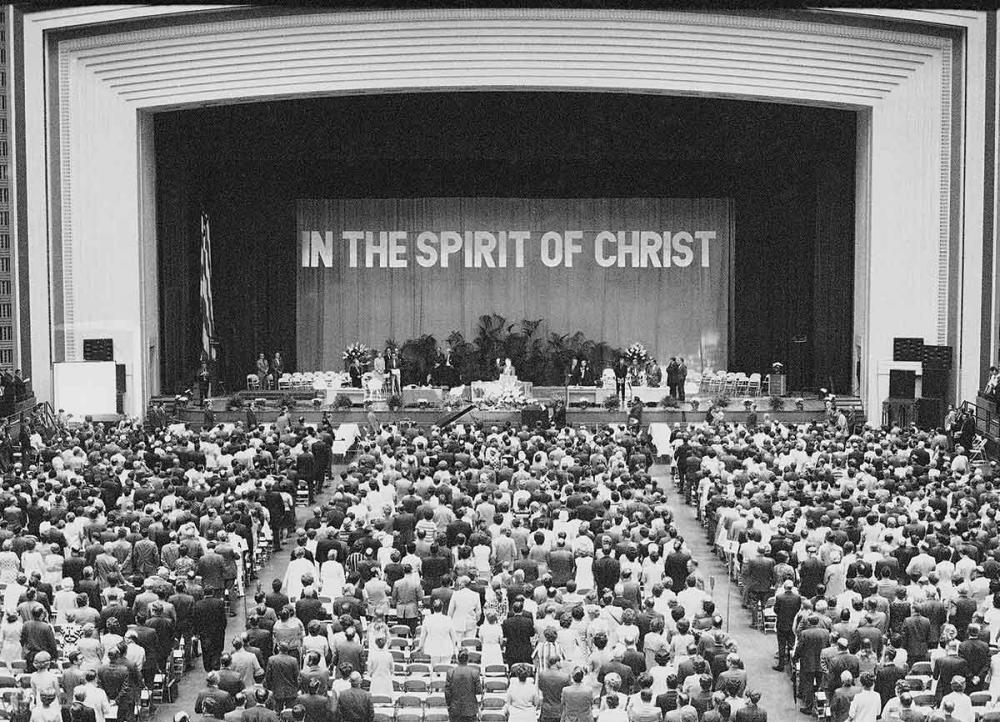
Before the fall: By 1971, when the SBC met in St. Louis (pictured above), it was already the largest Protestant denomination in the US. (AP)
Today, a faction within the SBC with even more radically patriarchal views is attempting its own takeover. Tom Ascol, a Florida pastor who ran unsuccessfully for president of the denomination this year, is one of the leaders of a contingent that represents “a strong segment of Southern Baptist pastors” pushing for a more “masculine, muscular Christianity,” said Brian Kaylor, a minister and the editor of the newsletter Word and Way, which covers the inner workings of the evangelical world. “I think it helps explain part of why there’s been such a problematic response, at times criminal response, to sexual abuse claims over the past few decades,” he said. The election of Bart Barber, a Texas pastor and the more establishment candidate, favored the status quo over a more extreme move to the right. Still, as Kaylor has documented, Ascol’s campaign broke ground by reaching out beyond Southern Baptist circles to right-wing media personalities like Charlie Kirk.
At the SBC’s 2019 annual meeting in Birmingham, the muscular Christianity group held a side conference titled “Mature Manhood in an Immature Age,” which featured some of the most openly misogynistic commentary I’ve witnessed in nearly two decades of covering the religious right. Ascol disparaged “soft men” as the “bane of a society,” because “they leave women and children without a protector.” He added that there was “nothing soft about Jesus,” who was never “triggered.” A “soft man,” he added, “has no business in the ministry.” Owen Strachan, who teaches at Grace Bible Theological Seminary, encouraged the audience to “train men in the image of the Warrior King Christ Jesus” and, “ideally,” to “train your daughter in submission.”
Ascol described Trump to me in an interview at the conference as a “pagan king” whom God had raised up and who had done “terrific” things in terms of the Supreme Court and on abortion and LGBTQ issues. More broadly, observers like Kaylor see Ascol’s caucus as trying to take the denomination in a more “Trumpian” direction, with or without Trump in office. Ascol and his supporters, Kaylor said, “are really obsessed with this idea that the SBC is becoming liberal and ‘woke,’ which is laughable.”
For abuse survivors, the denomination is far from “woke.” Christa Brown sees a direct line from Southern Baptist theology to the sex abuse scandal and related cover-ups. “I believe that unless and until Southern Baptists are willing to fully interrogate their own theology, this kind of conduct will remain a feature within their faith,” she said. For example, the concept of wifely submission that is part of “The Baptist Faith and Message” is “an authoritarian theology that promotes male headship and female submissiveness as being divinely ordered.” For Brown and other advocates for survivors of abuse, the policies enacted at the annual meeting this year in Anaheim in response to the Guidepost report were decidedly tepid. Attendees, known as “messengers,” voted to adopt two measures: the creation of an accessible database of abusers and the formation of a task force to study the recommendations of the Guidepost report. SNAP, a national organization that advocates for survivors of clerical sexual abuse, promptly denounced these actions as “very minimal.”
Brown told me that she had been raped in 1969 and that the leaders of her childhood church knew about it at the time. She went to the SBC in 2004 and then went public in 2005. She called for specific safeguards against abuse in 2006, some of which the denomination has still not adopted. For her, watching Trump rise with the support of prominent Southern Baptists was like a repeat of the sidelining and shaming of survivors, but on a much larger scale. When she saw leaders like Jeffress “giving support to a president who bragged about assaulting women,” Brown said, “it felt like déjà vu. Their minimization of horrific conduct was a pattern that we had already seen up close.”
Southern Baptist leaders spent decades working to impose their theological views of sex and gender on the country through law and policy, arguing that they represented a “Christian” or “moral” position. But to Brown, they “sacrificed all moral credibility. They normalized and minimized the sexual predations of a president in much the same way that they normalized and minimized the sexual predations of their clergy colleagues.” And, she added, “with nary a care, they left the rest of us—now the whole of our democracy—to deal with the fallout.”
Sarah Posner is a reporting fellow with Type Investigations and an expert on the intersection of religion and politics.
Copyright c 2022 The Nation. Reprinted with permission. May not be reprinted without permission. Distributed by PARS International Corp.
Please support progressive journalism. Get a digital subscription to The Nation for just $24.95!
